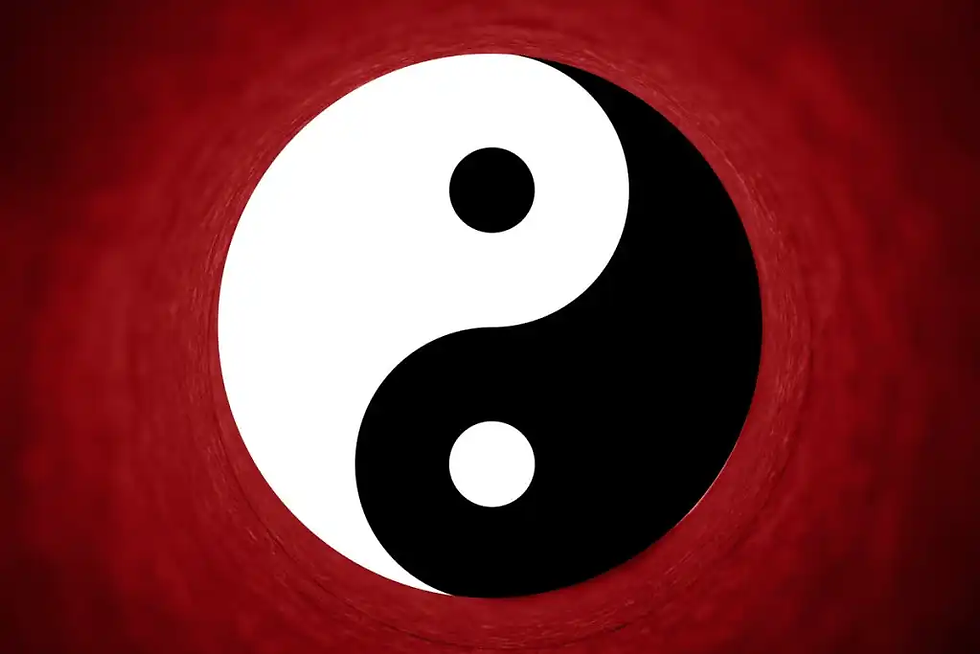Polarities & Transcendence
- Jaclyn

- Dec 6, 2021
- 3 min read
Updated: Jun 13, 2022
It is easy to apply polarity terms of right, wrong, good, or bad on someone or something based on the outward presentation manifested in a behavior, decision, or action. Our interpretation based on the end result is often where our own judgment and lack of compassion is expressed. It can be difficult to see the light in the dark and easy to demonize someone instead of understanding them, their struggle, or their pain. Everyone no matter how dark they appear is made of light and God consciousness. The degree to which the light shines is the choice of the participant. When we label those as victims or villains, we don’t have all the details; we only think we do based on the information set forward largely by external sources like other people, the media, etc. Unless we are in the experience of the person, we have no idea the lived reality that led to the outward action, behavior, or decision. It would be wise to observe rather than judge an experience we didn’t have and know nothing about.

Polarity is a tool that helps us learn about who we are choosing to be in this experience. While it can be a helpful tool in our soul’s growth and evolution, it is often misused to label other people and their experiences instead of observing those experiences with compassion and empathy. People who make undesirable choices, or choices we would not want to make, are doing so because they desire to experience and express a perceived harsher aspect of the dark polarity. While we may not want to experience this aspect, we can express gratitude in the understanding that we don’t have to. We can embody whatever aspect and degree of either polarity that we would like, knowing there is someone willing to express what we do not want to express and experience. When we take this approach to our understanding, we can observe from a higher mind and embody more empathy, compassion, and gratitude for ourselves and our chosen experience. We can abstain from comparison, unhelpful labels, and harsh judgments thereby becoming more self-aware in our evolving consciousness to transcendence.
While it can be difficult to always abstain from our opinions and judgments, it is worthwhile to consider an observer perspective than transcends the polarities. This perspective is the most fulfilling and honors both the light and dark polarities working congruently in harmony no matter how it appears externally. This is the more difficult path, as there will be others to dissuade this approach that appears to them as disconnected, unemphatic, and even harmful. However, this understanding couldn’t be further from the truth. Transcending the polarities and embodying compassion, empathy, and a bit of gratitude is more connected to our divine self than the divisive aspect of light vs dark, black vs white, good vs bad. This does not mean that we are not allowed to express our thoughts and feelings on manifested examples of polarity- but merely to become more mindful to avoid becoming entrapped in duality thinking, which is limited and disconnected.

We can use polarity in the way in which it is intended when we embody an observer perspective and implore compassion and empathy. It is wise to remember we are not in the lived experiences of others and don’t have all the details. Even if we had all the details, we can express gratitude that we are able to consciously choose the degree of whatever polarity we would like to embody, knowing there will be someone else willing to express an undesirable aspect of polarity that we rather not experience.
Consider the following questions below in this self-reflective assessment aimed to cultivate an observer perspective that is grounded in compassion and empathy rather than divisiveness and judgment next time you encounter expressions of polarity.
Did I live the experience of the person or situation I am judging?
Do I have all the details of the person or situation I am judging?
Is labeling the situation good or bad, right or wrong serving me?
Why do I feel the need to label and dissect the person or situation?
Can I identify aspects of myself or relate to this person or situation?
Is there a way I can embody empathy and compassion for this person or situation?
Can I become the observer and allow myself to understand without judgment?
Can I honor any level or aspect of gratitude in this experience?
Am I able to identify both polarities present in this experience?
Can I perceive how an observer perspective is more beneficial to me than one of judgment and comparison?
-Jaclyn



Comments